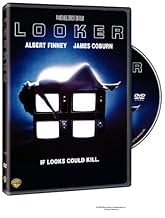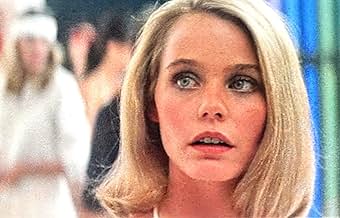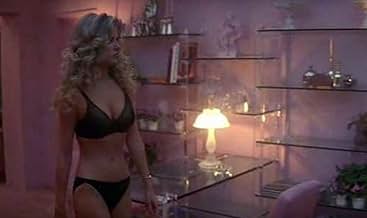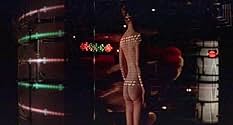VALUTAZIONE IMDb
6,1/10
6643
LA TUA VALUTAZIONE
Tre delle quattro modelle, che hanno subito un intervento di chirurgia plastica da Larry dopo un elenco computerizzato, sono morte.Tre delle quattro modelle, che hanno subito un intervento di chirurgia plastica da Larry dopo un elenco computerizzato, sono morte.Tre delle quattro modelle, che hanno subito un intervento di chirurgia plastica da Larry dopo un elenco computerizzato, sono morte.
- Regia
- Sceneggiatura
- Star
- Premi
- 1 vittoria e 1 candidatura in totale
Michael Hawkins
- Senator Robert Harrison
- (as Michael Gainsborough)
Donna Kei Benz
- Ellen
- (as Donna Benz)
Terrence E. McNally
- Technician in Scanning Room
- (as Terrence McNally)
Recensioni in evidenza
Plastic surgeon in Los Angeles investigates after some of his most beautiful clients--all fashion models--turn up dead. Thriller has a now-dated design but a terrific set-up. Writer-director Michael Crichton keeps his premise absorbing and exciting for about a third of its length, though he later resorts to assembly-line action, ending the picture on a whimper. Albert Finney just fine in the lead, Susan Dey terrific as his sidekick, yet the characters themselves are rather one-dimensional. Strictly as a time-filler, not bad. **1/2 from ****
Dr. Larry Roberts (Albert Finney) is a top Beverly Hills plastic surgeon who finds himself embroiled in a sinister mind-control conspiracy. After three of his patients are killed in suspicious circumstances, Larry takes it upon himself to protect the apparent next victim, Cindy (the beautiful Susan Dey) and also solve the mystery.
Looker' is possibly director Michael Crichton's most criminally underrated film. Admittedly the screenplay often leaves a lot to be desired but the initial premise is both intriguing and fear-provoking. Crichton's script makes some rather fascinating, and in hindsight rather perceptive, comments about how corporations can abuse both the media and the general public simply through the use of television. Towards the end a particularly pertinent speech is made by John Reaston (James Coburn) on how the general public is willing to submit automatically to the enormous power that television possesses. However, much of the power that Looker' could have potentially possessed is lost with poor pacing, inappropriate and unrealistic dialogue and a couple of major plot-holes. In fact, some eminent questions remain unanswered and the movie ends on a sort of anti-climatic note.
Crichton's direction appears to be somewhat disjointed as the pace of the movie alternates constantly. To begin with Looker' has the correct proportion of suspense to action and is quite thrilling to behold. Unfortunately, certain scenes such as a car chase drag on and become somewhat tedious. One particular sequence of events towards the end of the movie drags on for fifteen minutes and while to begin with is compellingly suspenseful, the sequence begins to feel old and certainly spoils what could have been an effective ending. Looker' also suffers from some particular bland performances, particularly from central actor Albert Finney. His performance was predominantly lacklustre and featured uninspired sequences in which Finney would avoid gunfire by unenthusiastically throwing himself across the floor. That being said Finney did seem to fit the role of Larry Roberts and was fairly entertaining to watch. Susan Dey and James Coburn were both enjoyable in their respective roles and one wonders why more was not done with their characters. Had more time been spent trying to develop these characters then maybe something more could have been done with the movie.
Surprisingly, despite all its flaws Looker' is still somewhat compelling. It is certainly not Crichton's best film but is still vastly underrated in my opinion. The opening sequence is suspenseful and intriguing which is occasionally echoed throughout the rest of the movie, though unfortunately not enough. Looker' is blessed with some wickedly delightful black humour, particularly towards the end and a bizarre, yet mesmerizing, electric musical score from Barry de Vorzon. Some fans will be happy to know that there are unnecessary scenes of full frontal nudity, including one from Susan Dey. The humorous overtones of that particular scene undoubtedly shine through. The ideas of hypnotic and subliminal messaging are what make Looker' compelling even though the film is still heavily damaged by the lack of decent characterisation and storytelling. I think Looker' is worth watching but is most certainly not to everyone's taste. My rating for Looker' 6.5/10.
Looker' is possibly director Michael Crichton's most criminally underrated film. Admittedly the screenplay often leaves a lot to be desired but the initial premise is both intriguing and fear-provoking. Crichton's script makes some rather fascinating, and in hindsight rather perceptive, comments about how corporations can abuse both the media and the general public simply through the use of television. Towards the end a particularly pertinent speech is made by John Reaston (James Coburn) on how the general public is willing to submit automatically to the enormous power that television possesses. However, much of the power that Looker' could have potentially possessed is lost with poor pacing, inappropriate and unrealistic dialogue and a couple of major plot-holes. In fact, some eminent questions remain unanswered and the movie ends on a sort of anti-climatic note.
Crichton's direction appears to be somewhat disjointed as the pace of the movie alternates constantly. To begin with Looker' has the correct proportion of suspense to action and is quite thrilling to behold. Unfortunately, certain scenes such as a car chase drag on and become somewhat tedious. One particular sequence of events towards the end of the movie drags on for fifteen minutes and while to begin with is compellingly suspenseful, the sequence begins to feel old and certainly spoils what could have been an effective ending. Looker' also suffers from some particular bland performances, particularly from central actor Albert Finney. His performance was predominantly lacklustre and featured uninspired sequences in which Finney would avoid gunfire by unenthusiastically throwing himself across the floor. That being said Finney did seem to fit the role of Larry Roberts and was fairly entertaining to watch. Susan Dey and James Coburn were both enjoyable in their respective roles and one wonders why more was not done with their characters. Had more time been spent trying to develop these characters then maybe something more could have been done with the movie.
Surprisingly, despite all its flaws Looker' is still somewhat compelling. It is certainly not Crichton's best film but is still vastly underrated in my opinion. The opening sequence is suspenseful and intriguing which is occasionally echoed throughout the rest of the movie, though unfortunately not enough. Looker' is blessed with some wickedly delightful black humour, particularly towards the end and a bizarre, yet mesmerizing, electric musical score from Barry de Vorzon. Some fans will be happy to know that there are unnecessary scenes of full frontal nudity, including one from Susan Dey. The humorous overtones of that particular scene undoubtedly shine through. The ideas of hypnotic and subliminal messaging are what make Looker' compelling even though the film is still heavily damaged by the lack of decent characterisation and storytelling. I think Looker' is worth watching but is most certainly not to everyone's taste. My rating for Looker' 6.5/10.
Obviously forgotten today, and maybe that's a problem.
Michael Crichton dealt in practical Science Fiction. How a potential technology could really cause problems in the here and now. This movie hit on a few of them, some of which HAVE come to pass.
His premise is that computers could be used to simulate characters (already has happened) and that they could be used to influence us by using algorithms to calculate our optimum responses. (Again, probably happening now, even if we don't know about it.)
The plot is that a plastic surgeon is asked to alter four women into perfect specimens, but three of them are killed after wards (they never really explain why.) In trying to protect the last, whom he develops a personal bond with, he uncovers a plot to use computer generated images (wow, and now they are real!) to manipulate our responses.
A note on nudity. We have Susan Dey of Partridge family fame going topless in a couple of scenes. We'd NEVER see that now. If we are lucky, we might see a name actress have her head CGI'd (ironic) onto a body double. But usually, the MPAA would go completely nuts and give the film an R or NC-17 rating.
Some things are dated, such as tape-reading computers and big hair on the women- SO 1980's. But the film's concepts hold up pretty well.
Michael Crichton dealt in practical Science Fiction. How a potential technology could really cause problems in the here and now. This movie hit on a few of them, some of which HAVE come to pass.
His premise is that computers could be used to simulate characters (already has happened) and that they could be used to influence us by using algorithms to calculate our optimum responses. (Again, probably happening now, even if we don't know about it.)
The plot is that a plastic surgeon is asked to alter four women into perfect specimens, but three of them are killed after wards (they never really explain why.) In trying to protect the last, whom he develops a personal bond with, he uncovers a plot to use computer generated images (wow, and now they are real!) to manipulate our responses.
A note on nudity. We have Susan Dey of Partridge family fame going topless in a couple of scenes. We'd NEVER see that now. If we are lucky, we might see a name actress have her head CGI'd (ironic) onto a body double. But usually, the MPAA would go completely nuts and give the film an R or NC-17 rating.
Some things are dated, such as tape-reading computers and big hair on the women- SO 1980's. But the film's concepts hold up pretty well.
You can take Michael Crichton's Looker, a way-back-then-high tech thriller with a media-industrial complex, one of two ways. Either it's an interesting preview of computer graphics being used for nefarious advertising gain, with a crime mystery to solve or it's a clumsily acted and directed story of how James Coburn is out to slaughter Albert Finney and Susan Dey using all sorts of out-of-this-world gizmos and tactics.
Personally, I think it's both.
Much like Crichton's Westworld, the movie depends heavily on the computer arts to fill in for substance, and like Westworld, it succeeds. Looker is a pleasant and exciting little period piece, a time capsule for what science and advertising might be heading toward in the not too distant future.
To be fair to yourself, you must forgive the creaky performances by Finney, Dey, and Coburn (plus everyone else). It's the combination of guns, girls, and gadgets that keep the story moving (Crichton gets your attention at the very start by introducing a television lovely asking plastic surgeon Finney to alter her in strangely precise details; then you get the pre-surgery mugshots of the girl with her supposed imperfections--and what imperfections!--in full view). It's cheap and creepy, but everyone in the theater was hooked instantly by the looker on screen.
Don't look too closely, though. The plot holes are big and numerous, so thinking is not recommended. It's the flash-attachments-on-steroids that cause catatonia and the computer mapping of Susan Dey, standing there with her imperfections exposed, that keep you interested. It's strange--I've always liked Dey's looks and I'm not about to complain about seeing her in the all-together, but the bloodlessness of computers, their soul-less nature robs the scene of its prurient nature.
Crichton has hit upon something here. Computers make us so nervous, even a quarter century later, that the use of a story of cynical cyber-manipulation of consumers robs the viewer of getting his or her jollies out of seeing good-looking people nekked or in danger or both. In some ways it robs us of our interest in the human drama that movies depend on to be of lasting quality. It's a double edged sword, but it's both subtle and very effective.
In general, Looker isn't subtle, nor is it a wholly satisfying entertainment, but it does deserve a look.
Personally, I think it's both.
Much like Crichton's Westworld, the movie depends heavily on the computer arts to fill in for substance, and like Westworld, it succeeds. Looker is a pleasant and exciting little period piece, a time capsule for what science and advertising might be heading toward in the not too distant future.
To be fair to yourself, you must forgive the creaky performances by Finney, Dey, and Coburn (plus everyone else). It's the combination of guns, girls, and gadgets that keep the story moving (Crichton gets your attention at the very start by introducing a television lovely asking plastic surgeon Finney to alter her in strangely precise details; then you get the pre-surgery mugshots of the girl with her supposed imperfections--and what imperfections!--in full view). It's cheap and creepy, but everyone in the theater was hooked instantly by the looker on screen.
Don't look too closely, though. The plot holes are big and numerous, so thinking is not recommended. It's the flash-attachments-on-steroids that cause catatonia and the computer mapping of Susan Dey, standing there with her imperfections exposed, that keep you interested. It's strange--I've always liked Dey's looks and I'm not about to complain about seeing her in the all-together, but the bloodlessness of computers, their soul-less nature robs the scene of its prurient nature.
Crichton has hit upon something here. Computers make us so nervous, even a quarter century later, that the use of a story of cynical cyber-manipulation of consumers robs the viewer of getting his or her jollies out of seeing good-looking people nekked or in danger or both. In some ways it robs us of our interest in the human drama that movies depend on to be of lasting quality. It's a double edged sword, but it's both subtle and very effective.
In general, Looker isn't subtle, nor is it a wholly satisfying entertainment, but it does deserve a look.
A plastic surgeon gets suspicious when the police question him about the death of a model he's worked on, and learns that all the models he's worked on who came in with "shopping lists" of miniscule changes that "had to be fixed, so I could be perfect," are dead. Susan Day has just come in with a list of her own, and he decides to keep an eye on her - and learns of a plot to use computer generated images made from detailed electronic measurements of the models to replace live models for commercials and acting. One bonus is about 3 minutes of Susan Day being measured, sans clothing. Let's face it, every boy who grew up watching "The Partridge Family" dreamed of the chance to see her like this! (The nudity is handled tastefully - there's nothing graphic.)
Lo sapevi?
- QuizThe first ever film to create 3D shading with a computer that produced the first ever CGI human character was the model Cindy (Susan Dey). This movie achieved this feat before Disney's more famous Tron (1982) hit the screens. The Web site Filmsite said of Cindy: "Her digitization was visualized by a computer-generated simulation of her body being scanned--notably the first use of shaded 3D CGI in a feature film. Polygonal models obtained by digitizing a human body were used to render the effects."
- BlooperAt the conference near the end, when Dr. Larry Roberts is disguised as a security guard, during several sequences getting in and out of elevators the wound on the side of his mouth disappears and reappears.
- Citazioni
Cindy Fairmont: Hi. I'm Cindy. I'm the perfect female type: 18 to 25. I'm here to sell for you.
- Versioni alternativeThe broadcast television version contains additional footage, including a scene where Reston (James Coburn) explains to Dr. Roberts (Albert Finney and Cindy ('Susan Dey') why Digital Matrix had the "perfect" models killed.
- ConnessioniFeatured in Overlook Hotel - Stanza 237 (2012)
I più visti
Accedi per valutare e creare un elenco di titoli salvati per ottenere consigli personalizzati
- How long is Looker?Powered by Alexa
Dettagli
- Data di uscita
- Paese di origine
- Lingua
- Celebre anche come
- Looker
- Luoghi delle riprese
- Art Center College of Design, Pasadena, California, Stati Uniti(Interiors and exteriors. As 'Digital Matrix Inc.' headquarters building.)
- Aziende produttrici
- Vedi altri crediti dell’azienda su IMDbPro
Botteghino
- Budget
- 8.000.000 USD (previsto)
- Tempo di esecuzione
- 1h 33min(93 min)
- Colore
- Mix di suoni
- Proporzioni
- 2.39 : 1
Contribuisci a questa pagina
Suggerisci una modifica o aggiungi i contenuti mancanti

































